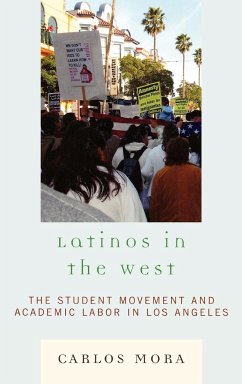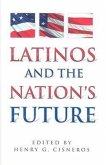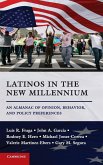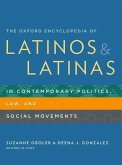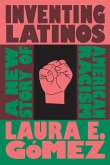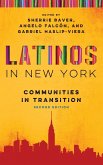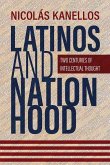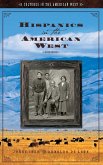This book focuses on the struggle by Latin Americans to open and maintain Chicano/a Studies programs in institutions of higher education in California. It raises critical questions for social theory about multicultural democracy, dealing with topics such as immigration, affirmative action and civil rights. Mora explains the links between this social movement and the needs of the Chicano/a people, the changes taking place in higher education, and the trends in the overall ethnic-nationalist movements in the U.S. where Latinos have been playing an increasingly leading role.
Hinweis: Dieser Artikel kann nur an eine deutsche Lieferadresse ausgeliefert werden.
Hinweis: Dieser Artikel kann nur an eine deutsche Lieferadresse ausgeliefert werden.
Latinos in the West arrives at a precipitous time when our understanding of the important historical and revolutionary role of Latino/as in our country needs to be deepened and appreciated. If democracy and social justice are to arrive in the United States, the nation must take account of the leadership role of the Latino/a populations, and not just those within the United States, but also those that are mobilizing south of 'la linea.' -- Peter McLaren, University of California, Los Angeles In Latinos in the West, students, teachers, researchers, policy makers, and school leaders will find a well-researched and clearly articulated account of the role played by Latino/a student activists in defense of higher education visa-vis larger sociopolitical dynamics in the United States. Carlos Mora has exposed the causes that produce tension and anxiety between the Latino/a community, higher education, and sectors of the dominant society, and it is time to pay attention to his reasonable recommendations for a more smoothly intertwined world. -- Carlos J. Ovando, Arizona State University To my knowledge, this is the first detailed and systematic chronicle and analysis of the Chicano/a social movement that developed at UCLA and sparked attention throughout California and the United States. As as result of this Movement, the quality of scholarship on Chicano/a Studies have increased dramatically both in quality and quantity, and Chicano/a Studies are now being accepted as bonafide Department in key US Universities, a long overdue process. Carlos Mora Ninci offers a fresh, articulated and insightful perspective on the history of Chicano/a struggles in the United States, and the UCLA movement, and a wonderful and refreshing as well as hopeful landscape for the educational future of people of color in the United States. A must to read... -- Carlos Alberto Torres, director, Paulo Freire Institute, UCLA Finally, a book that in pursuing a faithful recording of the role played by Chicano youth in bringing about a change in the contents of higher learning in the US west, accomplishes the feat of belying a long-standing stereotype: that of inaction on the part of the descendents of Mexicans. An added plus, for those who teach American Studies, is the section dedicated to understanding the current plight of undocumented foreigners and the strategies the latter have adopted to demonstrate their adherence to the values the United States stands for... -- Sheila Carmody, professor emeritus of American Studies, National University of Cordoba, Argentina This study makes excellent use of personal interviews, the records of Chicano activist groups, student revolutionary pamphlets, newspapers, fieldwork narratives of the Chicano studies strikes, contemporary journals, and a wealth of secondary scholarship relating to higher education. -- Ryan Dearinger Southern California Quarterly This excellent work of history and sociology describes the growth of the Chicano/a movement along with the equally important growth of the rapidly changing immigrant societies in the US. Mora has produced an insightful and richly detailed history of labor, students, and political movements all brought together in one book that should be required reading for anyone seeking to understand the emerging majority population in the Southwestern US. -- Duane E. Campbell, California State University, Sacramento To my knowledge, this is the first detailed and systematic chronicle and analysis of the Chicano/a social movement that developed at UCLA and sparked attention throughout California and the United States. As as result of this Movement, the quality of scholarship on Chicano/a Studies have increased dramatically both in quality and quantity, and Chicano/a Studies are now being accepted as bonafide Department in key US Universities, a long overdue process. Carlos Mora Ninci offers a fresh, articulated and insightful perspective on the history of Chicano/a struggles in the United States, and the UCLA movement, and a wonderful and refreshing as well as hopeful landscape for the educational future of people of color in the United States. A must to read. -- Carlos Alberto Torres, director, Paulo Freire Institute, UCLA Finally, a book that in pursuing a faithful recording of the role played by Chicano youth in bringing about a change in the contents of higher learning in the US west, accomplishes the feat of belying a long-standing stereotype: that of inaction on the part of the descendents of Mexicans. An added plus, for those who teach American Studies, is the section dedicated to understanding the current plight of undocumented foreigners and the strategies the latter have adopted to demonstrate their adherence to the values the United States stands for. -- Sheila Carmody, professor emeritus of American Studies, National University of Cordoba, Argentina
